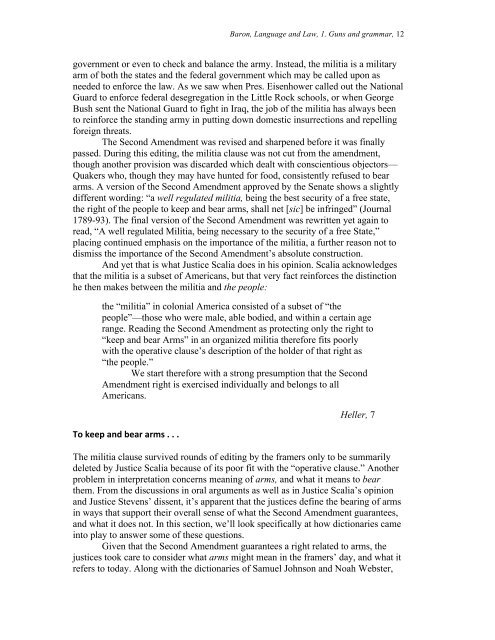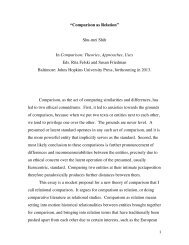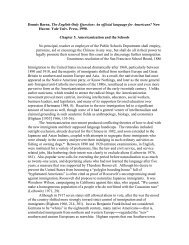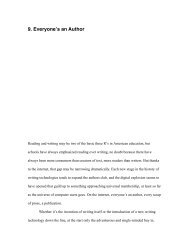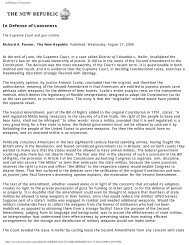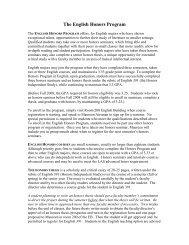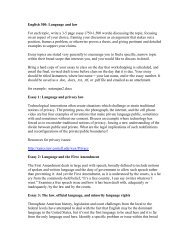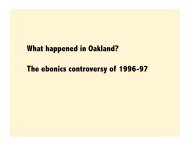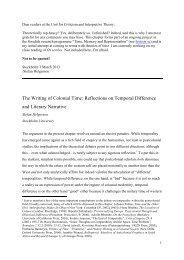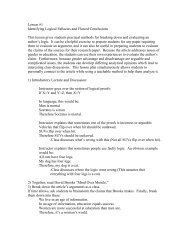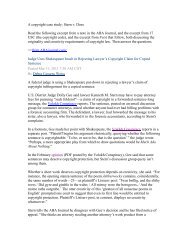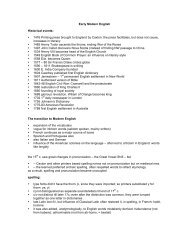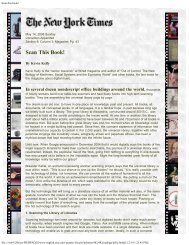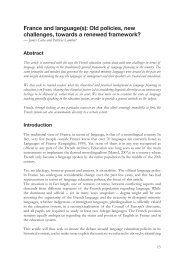1. Guns and Grammar: Determining what the Second ... - English
1. Guns and Grammar: Determining what the Second ... - English
1. Guns and Grammar: Determining what the Second ... - English
You also want an ePaper? Increase the reach of your titles
YUMPU automatically turns print PDFs into web optimized ePapers that Google loves.
Baron, Language <strong>and</strong> Law, <strong>1.</strong> <strong>Guns</strong> <strong>and</strong> grammar, 12government or even to check <strong>and</strong> balance <strong>the</strong> army. Instead, <strong>the</strong> militia is a militaryarm of both <strong>the</strong> states <strong>and</strong> <strong>the</strong> federal government which may be called upon asneeded to enforce <strong>the</strong> law. As we saw when Pres. Eisenhower called out <strong>the</strong> NationalGuard to enforce federal desegregation in <strong>the</strong> Little Rock schools, or when GeorgeBush sent <strong>the</strong> National Guard to fight in Iraq, <strong>the</strong> job of <strong>the</strong> militia has always beento reinforce <strong>the</strong> st<strong>and</strong>ing army in putting down domestic insurrections <strong>and</strong> repellingforeign threats.The <strong>Second</strong> Amendment was revised <strong>and</strong> sharpened before it was finallypassed. During this editing, <strong>the</strong> militia clause was not cut from <strong>the</strong> amendment,though ano<strong>the</strong>r provision was discarded which dealt with conscientious objectors—Quakers who, though <strong>the</strong>y may have hunted for food, consistently refused to beararms. A version of <strong>the</strong> <strong>Second</strong> Amendment approved by <strong>the</strong> Senate shows a slightlydifferent wording: “a well regulated militia, being <strong>the</strong> best security of a free state,<strong>the</strong> right of <strong>the</strong> people to keep <strong>and</strong> bear arms, shall net [sic] be infringed” (Journal1789-93). The final version of <strong>the</strong> <strong>Second</strong> Amendment was rewritten yet again toread, “A well regulated Militia, being necessary to <strong>the</strong> security of a free State,”placing continued emphasis on <strong>the</strong> importance of <strong>the</strong> militia, a fur<strong>the</strong>r reason not todismiss <strong>the</strong> importance of <strong>the</strong> <strong>Second</strong> Amendment’s absolute construction.And yet that is <strong>what</strong> Justice Scalia does in his opinion. Scalia acknowledgesthat <strong>the</strong> militia is a subset of Americans, but that very fact reinforces <strong>the</strong> distinctionhe <strong>the</strong>n makes between <strong>the</strong> militia <strong>and</strong> <strong>the</strong> people:<strong>the</strong> “militia” in colonial America consisted of a subset of “<strong>the</strong>people”—those who were male, able bodied, <strong>and</strong> within a certain agerange. Reading <strong>the</strong> <strong>Second</strong> Amendment as protecting only <strong>the</strong> right to“keep <strong>and</strong> bear Arms” in an organized militia <strong>the</strong>refore fits poorlywith <strong>the</strong> operative clause’s description of <strong>the</strong> holder of that right as“<strong>the</strong> people.”We start <strong>the</strong>refore with a strong presumption that <strong>the</strong> <strong>Second</strong>Amendment right is exercised individually <strong>and</strong> belongs to allAmericans.To keep <strong>and</strong> bear arms . . . Heller, 7The militia clause survived rounds of editing by <strong>the</strong> framers only to be summarilydeleted by Justice Scalia because of its poor fit with <strong>the</strong> “operative clause.” Ano<strong>the</strong>rproblem in interpretation concerns meaning of arms, <strong>and</strong> <strong>what</strong> it means to bear<strong>the</strong>m. From <strong>the</strong> discussions in oral arguments as well as in Justice Scalia’s opinion<strong>and</strong> Justice Stevens’ dissent, it’s apparent that <strong>the</strong> justices define <strong>the</strong> bearing of armsin ways that support <strong>the</strong>ir overall sense of <strong>what</strong> <strong>the</strong> <strong>Second</strong> Amendment guarantees,<strong>and</strong> <strong>what</strong> it does not. In this section, we’ll look specifically at how dictionaries cameinto play to answer some of <strong>the</strong>se questions.Given that <strong>the</strong> <strong>Second</strong> Amendment guarantees a right related to arms, <strong>the</strong>justices took care to consider <strong>what</strong> arms might mean in <strong>the</strong> framers’ day, <strong>and</strong> <strong>what</strong> itrefers to today. Along with <strong>the</strong> dictionaries of Samuel Johnson <strong>and</strong> Noah Webster,


